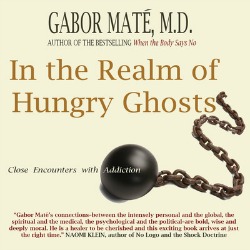By MaryCarl Guiao
In The Realm of Hungry Ghosts by Gabor Mate is a compelling tale of addiction, abuse, and compassion. Mate is a practising physician in Vancouver's Downtown Eastside and he based the book on two decades of personal experience and countless interviews with his patients. The focus of the text is addiction but it covers everything from addiction to chemical drugs, to the author's own addiction to classical CDs. This Canadian best-seller is written with exceptional elegance and style despite the depressing and sometimes horrific stories told within. This book would appeal to both a professional audience interested in medical and treatment issues, but also to people who live with "hardcore" addictions seeking to put their own experiences into context, an understanding of their illness, and a path to healing.
The author makes it clear that conventional treatment and recovery are not exactly the end goal of his work. It has more to do with compassion - he strives to let these people be who they are without judgement, and in the process helps them to reduce the harm they would otherwise inflict on themselves and the local community. Canada's ground-breaking safe injection site is housed in the same building as Mate's office and is an example of this line of thinking: if you are going to inject yourself with drugs, at the very least you should have clean needles and medical staff nearby. He takes issue with the punitive nature of Canada's drug laws and a society that "ostracises" those that become addicted to chemical drugs. The non-profit Portland Hotel Society where he is employed offers a range of programs designed to meet the basic human needs of those who live and work on Vancouver's infamous Hastings Street. Basic housing, meals, medical and dental care are the base services offered, and when the Society can afford it, they also organize camping trips, movie nights, and other social events to provide alternative experiences to some of Canada's most abused, shunned and forgotten inhabitants.
Vermin, disease and death are all too common in the lower Eastside and the opening pages alone recount details of over ten lives lost to the lifestyle of drug addicts. The book is a mix of anecdotes, retold stories, and hard facts. Almost every patient of Mate's is a convicted criminal, more than half are diagnosed with mental illness, and a third are HIV-positive. But amidst the heart-wrenching details of poverty-stricken Hastings Street, the reader is struck with a sense of awe in how the book portrays these homeless, and in many ways helpless, individuals as human, and worthy of dignity and compassionate care. Mate himself remarks how at times he feels "full of disapproval and judgement", but he also tries to recognize that the contradiction in his personal views originates within him, and that there is a power imbalance in the role he plays in their lives, and the role they play in his.
It is this element of self-reflection that makes the book ground-breaking and effective in facilitating healing. While the first 100+ pages focus on crack, heroin and meth addictions, the later pages offer insight into the author's own "high-status" addiction: the purchase of classical CDs, of all things. The switch is not only helpful to lighten the tone of an otherwise heart-wrenching subject matter, but it is also a very persuasive way to influence the reader to self-reflect on their own addictions. The narrative allows one to appreciate how they too are influenced by many of the same primal urges of instant gratification that drive addiction, and to reflect on how it is that some of us get addicted to crack, while others seek pleasure in food, sex, or buying things like classical CDs. The tell-tale signs of addiction, like hiding details from friends and family, are confessed by the author in the context of his addiction to buying CDs in a way that encourages the reader to deepen their understanding about their lives and addictive tendencies. Aside from being an interesting literary style, it is an incredibly powerful way to generate a compassionate understanding by the reader of the ways in which they too could have been a crack addict if their life had been slightly different, and most especially if they were more frequently prevented from accessing opportunities to gain thorough and compassionate self-understanding.
Mate is drawn to classical CDs partly because he was exposed to them early on. Might the addicts in this book have been drawn to something else if their childhood involved different influences, ques, and precursors?










